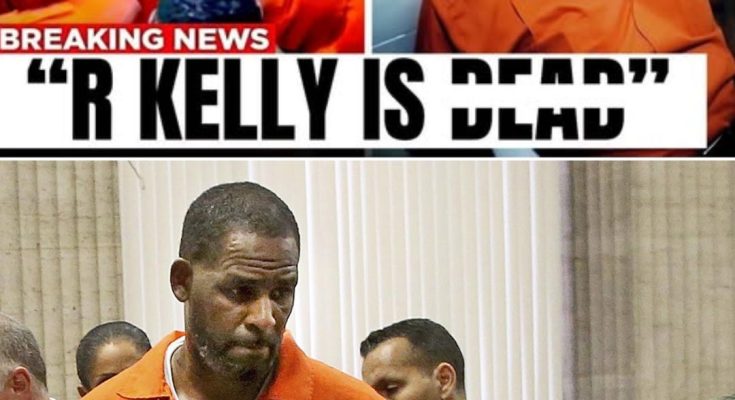🚨In the shadowy corridors of America’s federal prison system, the story of R. Kelly—once the undisputed King of R&B—has taken a dark, labyrinthine turn.

In the shadowy corridors of America’s federal prison system, the story of R. Kelly—once the undisputed King of R&B—has taken a dark, labyrinthine turn. What began as a high-profile conviction for sexual abuse and racketeering has devolved into a saga of alleged murder plots, prison corruption, and explosive claims of industry sabotage.
Now, with Kelly’s health and safety in question, and with new legal filings blowing the lid off what really goes on behind bars, the world is asking: What happened to R. Kelly in jail?
A Star Behind Bars
R. Kelly, born Robert Sylvester Kelly, was sentenced in 2022 to 30 years in federal prison after a Brooklyn jury found him guilty on charges of sex trafficking, racketeering, and the sexual exploitation of minors. He was later hit with an additional 20-year sentence in Chicago, with most of that time running concurrent to his New York conviction. Once a global superstar, Kelly now faces the prospect of spending the rest of his life incarcerated.
But while the world remembers Kelly’s courtroom downfall, few have paid attention to the chaos and danger that have defined his time behind bars.
The Alleged Murder Plot
In June 2025, Kelly’s legal team, led by attorney Bo Brinley, filed an emergency motion in federal court that stunned even seasoned observers. The motion demanded Kelly’s immediate release to home detention, alleging that officials within the Bureau of Prisons (BOP), in concert with members of the Aryan Brotherhood, were actively plotting to murder him.
The motion was not just legal theater. It included a sworn statement from Mcquille Glenn Stein, a terminally ill inmate and alleged Aryan Brotherhood shot-caller. According to Stein, three BOP officials at FCI Butner, North Carolina, offered him freedom in exchange for killing Kelly. Stein, who has a history of escaping federal custody, was allegedly promised a transfer and the opportunity to escape so he could die a free man.
The reason for the plot, according to Stein’s affidavit: Kelly was about to expose “facts that would be extremely inflammatory and damaging to the Bureau of Prisons and the Department of Justice.”
But in a twist worthy of a Hollywood script, Stein claims he refused the order and instead warned Kelly of the plot. Stein’s declaration also alleges that such arrangements—where prison officials direct gang members to commit violence—are common in the federal system.

Retaliation and Solitary Confinement
After the alleged murder plot was exposed, Kelly’s legal team claims he was placed in solitary confinement in conditions they describe as “retaliatory and inhumane.” According to the filings, Kelly is now so fearful for his life that he refuses to eat prison meals or use commissary goods, believing they may be poisoned. He is reportedly unable to contact his family and is being held in a cell infested with spiders.
The legal team alleges that this isolation is not for Kelly’s protection, but rather a form of punishment for exposing the murder plot—a claim that, if true, would point to a deeply corrupt and vindictive prison bureaucracy.
A Pattern of Corruption?
The murder plot is only one part of a much larger conspiracy, according to Kelly’s lawyers. They claim the entire criminal case against Kelly was tainted by constitutional violations and prosecutorial misconduct.
One of the most damning pieces of evidence, according to Kelly’s attorneys, is a signed declaration from Keshan Mogata Moody, Kelly’s former cellmate. Moody claims he was solicited by prosecutors and prison guards to steal Kelly’s privileged attorney-client correspondence, which was then copied and used against him at trial. If true, this would represent a massive breach of constitutional rights and could undermine the entire case against Kelly.
Federal Response: Dismissal and Derision
Federal prosecutors have responded to these allegations with open contempt. In court filings, they described Kelly’s murder plot claims as “fanciful” and “deeply unserious,” accusing him of making a mockery of the harm suffered by his victims. They argue that Kelly’s placement in solitary confinement is evidence that prison officials are taking his safety seriously, not plotting against him.
:max_bytes(150000):strip_icc():focal(749x0:751x2)/r-kelly-mugshot-061725-eb2e3ab8607d489ca104cf0de48e0de3.jpg)
But for Kelly’s supporters, the dismissive tone of federal prosecutors only adds fuel to the fire. They see a pattern of powerful institutions working to silence and destroy a black celebrity who knows too much.
Health Crisis and Medical Neglect
If the murder plot wasn’t enough, Kelly’s health has taken a dangerous turn. According to newly filed court documents, he suffered a medical emergency in June 2025 after allegedly being given an overdose of medication by prison staff. Kelly reportedly woke up feeling faint and dizzy, collapsed, and was rushed to a hospital, where doctors discovered blood clots in both legs and his lungs.
Despite recommendations that Kelly remain hospitalized for surgery and further care, his legal team claims he was forcibly removed from the hospital by prison guards and denied adequate treatment. With diabetes and ongoing circulatory issues, Kelly’s physical and mental condition appears to be deteriorating rapidly.
Cellmate Revelations: Ronnie Bo Speaks Out
Perhaps the most explosive revelations come from Kelly’s former cellmate, Ronnie Bo Williams—a former federal inmate who has since written a book about his time with Kelly. Williams claims that Kelly’s downfall was orchestrated by powerful industry figures, including Jay-Z, who allegedly funded the “Surviving R. Kelly” documentary through his ex-girlfriend, Dream Hampton.
According to Williams, Kelly discovered that his music catalog was worth $1.2 billion—more than Jay-Z’s at the time—but was unable to access his money and had to keep touring to survive. Williams alleges that when Kelly began investigating where his money was going, the legal troubles intensified, and the industry turned on him.
Williams also claims that Kelly was blacklisted for refusing to “play ball” with certain industry executives, including rebuffing advances from powerful figures like Quincy Jones. These allegations, though difficult to verify, paint a picture of an industry where loyalty and silence are valued above all else—and where those who step out of line are dealt with harshly.
A Systemic Problem
The story of R. Kelly in jail is not just about one man’s fall from grace. It raises troubling questions about the American justice system, the power of the prison-industrial complex, and the hidden machinations of the entertainment industry. If even a fraction of the allegations are true, they point to a system where violence, corruption, and blackmail are routine tools of control.
Kelly’s legal team has gone so far as to appeal directly to former President Donald Trump for a pardon, arguing that Kelly is a victim of prosecutorial misconduct and systemic targeting of black men. So far, their pleas have fallen on deaf ears.
The Road Ahead
As of July 2025, R. Kelly remains in solitary confinement at FCI Butner, with no resolution to his emergency motion. The U.S. Supreme Court has declined to hear his appeal, and his legal avenues are rapidly closing. Unless new evidence emerges or a higher court intervenes, Kelly is not due for release until 2045—by which time he will be 78 years old, if he survives that long.
The secrets he claims to hold about the music industry, the prison system, and the powers that be may die with him. But the shockwaves from his case continue to reverberate, raising urgent questions about justice, accountability, and who really holds the power in America.
For now, the world can only watch as the saga unfolds—and wonder what really happened to R. Kelly in jail.



